Is the hub of global development innovation the “other” Washington?
Posted on October 30, 2011.
Excerpt from a blog by Leela Stake of APCO Worldwide about Global Action Day and the Global Washington Conference
“Next week, I’ll head up to the Microsoft* campus in Redmond, Wash., to moderate a panel at Global Washington’s third annual conference. It’s a great model of statewide collaboration in the development community, and I thought you might want to know more about it.
During the 20th century, the state of Washington built a reputation for its airplanes, timber, software and coffee. Yet the state is now leading the way in addressing an entirely different class of global needs: good health, education, employment, food, shelter, and a chance for a better life.”
To read the full post, visit http://sharedpurpose.virtualvantagepoints.com/the-hub-of-global-development-innovation/
IN PERSON Questions For: Bookda Gheisar Executive Director Of Global Washington
Posted on October 28, 2011.
After spending more than two decades working on urban Seattle issues with Social Justice Fund Northwest, grassroots fundraiser and nonprofit guru Bookda Gheisar took on a global challenge. As executive director of Global Washington, a member association for the state’s growing global health and development sector, she’s had to lead the new group during an economic downturn and a period when international aid faces enormous challenges in conflict and disaster zones.
Do you sense a competition between local and global nonprofit movements in the Seattle area? Because of the tough economy over the last few years, a lot of my colleagues and friends in the nonprofit sector can think that there is a competition. We feel like there is only so much; there is only so much of the pie that is available to us and we have to compete for that. But I really believe in a different way of thinking (other) than that scarcity mentality.
You previously worked for Social Justice Fund Northwest — how has it been to shift your focus from local to global? Over the last few years, I feel like the separation between local and global has become a lot smaller, the gap has closed, so we are more and more people of the world. And I just hear less and less people asking questions (like) “Well, should I do something locally or should I do something globally?” Because more and more of us understand that we’re interconnected as human beings.
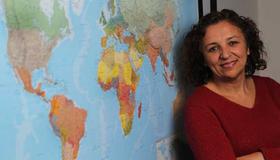
BUSINESS JOURNAL PHOTO | Anthony Bolante
Global Washington has an upcoming conference, Opportunities and Obstacles in Turbulent Times, on Oct. 31 and Nov. 1 in Redmond. Why you are looking at the challenges of delivering aid in conflict and disaster zones? In the last 10 years, we’ve seen more and more turbulence: political, economic, social (and) environmental turbulence. Now we’re living in an environment, we’re living in a world, where we’re in a constant state of turbulence and crisis, some very positive, some very negative. And the international development community is having to adapt and adjust and change every day based on the earthquake in Haiti, the famine in Somalia, the poitical uprising in Egypt. So our conference is about a time to come together to look at the opportunities and interesting innovations that’s come out of these last few years. What are we doing that’s working, and how can we learn from each other moving forward?
How are global health and development groups adapting to conflict and disaster zones? I’ll talk about two specific examples. One is about Mercy Corps in Myanmar. Right after the cyclone (in 2008), when the aid workers were unable to reach the region and work with people who really needed aid, they found that they were able to rent a barge and have their crew work out of (it) to be able to reach people and be able to provide the relief services to the community. I think that’s a really interesting story. The next one is a project in Afghanistan by World Vision workers, where they have a mobile app that health care workers use to be able to reach the community. But this mobile app is designed with very (little) text, so that even health care workers with lower literacy abilities can use these to be able to do their work and be able to reach the communities that they’re working with.
Is there a move toward micro-philanthropy that’s a better way to engage the community? When you have a donor who gives $200,000 and they change their mind and they want to move on, you feel a tremendous impact. When you have 1,000 donors who give $1,000 each, and one of them wants to leave — all of your eggs are not in one basket. You have a broad base of support. People care about your work. They’re committed; they’re mobilized. And sometimes people change their minds, which they should, and your livelihood is not dependent on it.
How has the economy impacted nonprofits’ efforts overseas? One of the panels at the conference is focusing on new ways of fundraising. I think that the economy has made all of us think a lot more about relationship building, community organizing, building a broad base of support: hundreds of donors who give out $100 each, as opposed to really all of us searching for people who give their really major gifts. That’s one thing I see happening. We’re seeing more and more nonprofit/for-profit hybrids. That’s a completely new trend in this sector of nonprofits — for nonprofits to start thinking about combining the two and coming up with a new model is groundbreaking, and I love seeing that.
IN PERSON Questions For: Bookda Gheisar Executive Director Of Global Washington
Premium content from Puget Sound Business Journal | Valerie Bauman | October 28, 2011
Washington State’s Most Important Export: Hope
Posted on October 27, 2011.
Think of Washington state and you probably picture a rainy emerald region with an economy powered by airplanes, timber, software, and salmon, and a people powered through the eternal mist by coffee.
But there is one vital industry absent from this otherwise, pretty accurate understanding of my birthplace and home: hope.
It is arguably the state’s most important industry and export.
From the University of Washington, which regularly sends more of its graduates into the Peace Corps each year than any other American college, to Washington’s army of non-profit workers armed with professionalism and passion – working for the greater global good is in our DNA.
Call our corner of the US the “Corridor of Compassion,” or an “Idealist’s Silicon Valley.”
Washington state is home to the largest non-profit in the world – World Vision – and the largest foundation in the world – The Bill & Melinda Gates Foundation. And it is home to more than 300 other non-profit organizations of varying focus and size. From PATH, which over the last year ended meningitis A in three West African countries, to my organization, Landesa, which partnered with governments on reforms that, last year alone, gave more than 2 million poor families legal control over the land they till and the chance to literally grow themselves out of poverty, to Esperanza International, which is providing micro-credit, education and health care to poor families in the Dominican Republic, there is little doubt that Washington state’s pragmatic optimists are having a huge impact.
What we’ve discovered while trying to tackle some of the world’s most challenging problems –polio, HIV, malaria, landlessness, generational poverty, malnutrition – is that poverty, sickness, and frustration abroad affects us at home. Addressing these problems is crucial because of the impact this has on human lives outside of our borders. But helping the needy and vulnerable far away helps all of us; making societies more healthy, prosperous, and stable is in everyone’s best interest.
With increasing need here in the US, the inclination among many is to scale back our generosity, shorten our horizon, take care of our own.
But Washington state, with its $4 billion global health sector that generates $143 million in annual tax revenue for the state and local government, offers a different model.
On November 1, 2011, the Mayor of Seattle, Mike McGinn, and a consortium of global development organizations united under the banner of the organization Global Washington, are calling on the state’s residents to learn more about our global development community and to support it. It is a sentiment worth noting for those beyond our state’s borders.
Washington state is the largest exporter in the nation on a per capita basis; one in three jobs here is tied to international trade and thus linked to development outside our national borders. We have the most globally connected workforce in the country. Washington state exports a total of nearly $40 billion worth of goods and services to every country on the planet.
Much of this is thanks to the hundreds of businesses, non-profits, academic institutions, and foundations across the state zealously working to better conditions in all 144 developing countries and developing life-saving vaccines and pro-poor technologies and programs.
Countries around the world, from Afghanistan to Uganda, would be less stable, less secure, and less sure of their future if we stopped our good work.
And so would we.
Washington State’s Most Important Export: Hope
The Huffington Post | Tim Hanstad | President & CEO, Landesa | October 27, 2011
Global Development As A Vital Export: Changing Lives, Creating Opportunity
Posted on October 26, 2011.
11/1/11 is a special day in Washington state.
The state exports more goods and resources internationally than any other state in the nation. One in every three jobs in our state is, in some way, tied to foreign trade. The state exports nearly $40 billion worth of goods and services to every corner of the globe. But it’s not just about commercial products and services; it’s also about the development sector.
Global Washington, a membership based development organization, is the leading force behind the state’s growing international development sector. The significance of Global Washington and its member organizations is being recognized by Seattle Mayor Mike McGinn who is marking 11/1/11 as “Global Action Day.”
Washington State is exporting long-term sustainable solutions to help developing nations and Global Action Day will bring a focus on the critical nature of that work, while allowing others to get involved and actually impact change at home and around the world
The state is not only home to the world’s largest nonprofit, World Vision, and the world’s largest foundation, the Bill & Melinda Gates Foundation, there are also over 300 non-governmental organizations working in global development addressing some of the world’s most challenging problems and investing in people through education, health care, and expanded economic opportunity. The international development sector in the state is producing jobs at home, and sending hope abroad.
The global development sector in Washington State is changing lives in 144 countries, but it’s also generating millions in state and local tax revenue and creating hundreds of jobs:
- Washington State’s $4 billion global health sector generates $143 Million in annual tax revenue for the state and local government.
- 290 companies in Washington contribute to global sustainable development.
- 266 Washington businesses develop products and offer services that address societal needs with marketplace solutions, contributing to society as well as to their bottom lines.
- 119 Washington companies are improving the environment, increasing health and decreasing poverty worldwide through their operations.
- 28 companies support 124 international philanthropic projects.
- Meanwhile, companies like Microsoft, Boeing and Starbucks support a wide range of development projects across the globe. This is quite an impressive achievement for a small state.
We know the U.S. economy is suffering, and help is certainly needed here at home. But Global Washington members show that investing knowledge, resources, time and technology abroad not only betters the lives of others around the world, it also strengthens our community culturally and economically.
The international nonprofits and foundations that are headquartered here are creating hundreds of good jobs and attracting top talent from around the world. We at Microsoft are very proud to be part of this effort and commend the work that Global Washington is doing and on Global Action Day we invite the public to join the effort.
The theme of Global Action Day is “Changing Lives, Creating Opportunity,” and the goal is to raise public awareness about the innovative and impactful work of Washington’s global development sector and to encourage Washingtonians to increase their philanthropy and involvement in this important work.
Please join us on 11/1/11.
Global Development As A Vital Export: Changing Lives, Creating Opportunity
The Huffington Post | Akhtar Badshah | Senior Director of Global Community Affairs, Microsoft Corporation | October 26, 2011
11.1.11 – Global Action Day
Posted on October 20, 2011.
The “99 percent” protesters occupying Wall Street, Seattle, and other U.S. cities have been in the news recently, protesting against the “one percent” of the wealthiest in the country. However, there is another “one percent” that perhaps should be in the news and on the minds of Americans. That is the one percent of the U.S. Budget that supports foreign aid.
Most Americans think that U.S. investment in foreign aid is much higher and therefore should be a target for budget cuts. A recent poll by the Kaiser Family Foundation showed that most Americans think the investment is 25 percent of the U.S. budget, not the one percent that is true in fact.
This mis-match between opinion and fact is one of the reasons that Global Washington and several of its member organizations are sponsoring the Global Action Day Campaign. One of the goals of the Campaign is to have Washingtonians learn about, support, and join the more than 140 members of Global Washington that are working in the global development sector.
Another goal of the Global Action Day Campaign is to explain the many ramifications of the work done abroad by Global Washington members. Not only are member organizations impacting lives abroad by reducing disease, providing educational opportunities, and strengthening communities and economies around the world, but they are also supporting the local economy as well. One out of every three jobs in the State of Washington is, in some way, related to foreign trade and international development.
Seattle mayor Mike McGinn has proclaimed November 1, 2011 (11.1.11) as Global Action Day in the City of Seattle, and urges all to “celebrate the accomplishments, innovation, leadership and impact of Seattle’s global development sector for the betterment of the world.”
Other groups across the country are sponsoring other events to highlight the importance of foreign aid. Earlier this month, the U.S. Agency for International Development, along with other organizations including Global Washington members PATH and World Vision, launched a campaign called “The Power of 1%” to highlight the economics of global health, and the benefits that U.S. investments overseas have for Americans at home.
October 2011 Newsletter
Posted on October 19, 2011.
Welcome to the October 2011 issue of the Global Washington newsletter. If you would like to contact us directly, please email us.
IN THIS ISSUE
Note from our Executive Director
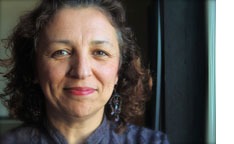
Greetings,
By now, you may have heard the news that 11.1.11 is Global Action Day. Seattle mayor Mike McGinn has issued an official proclamation declaring November 1st, 2011 a day to celebrate the accomplishments, innovation, leadership, and impact of the global development sector here in Washington State.
Please help us spread the word about this important day! As someone who is involved in global development, we ask that for the next two weeks you mobilize your mailing list, your volunteer base, your coworkers, your fans and your followers! We have created a website, a Media Toolkit and a hash tag to make it fun and easy to share with your networks.
I also want to remind you that our Third Annual Conference is coming up on October 31st and November 1st. Last year’s conference convened over 400 members of Washington’s global development sector and was an important time to share ideas and meet others in the field. This year, we will hear from exciting speakers like Dr. Victoria Hale, founder of the non-profit pharmaceutical company Medicines360, and travel guru Rick Steves, who will talk about travel as a political act. You can visit our website for a complete list of speakers and full conference agenda.
Please don’t miss out on Global Action Day, or our annual conference. These are exciting opportunities to connect to others in the field, to celebrate the many accomplishments of Washington’s global development sector, and to continue our work to make the world a more equitable and prosperous place.
In unity,

Bookda Gheisar, Executive Director
Featured Story
Celebrating Global Action Day – 11.1.11
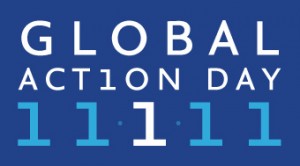 11.1.11 is Global Action Day. November 1, 2011 has been proclaimed by the mayor of Seattle as a day to recognize the accomplishments, innovation, and impact of Washington State’s growing global development sector. Global Action Day is also an opportunity for Washingtonians to learn about, support, and join the more than 140 members of Global Washington who are working to create jobs at home and impact lives abroad by reducing disease, providing educational opportunities, and strengthening communities and economies around the world.
11.1.11 is Global Action Day. November 1, 2011 has been proclaimed by the mayor of Seattle as a day to recognize the accomplishments, innovation, and impact of Washington State’s growing global development sector. Global Action Day is also an opportunity for Washingtonians to learn about, support, and join the more than 140 members of Global Washington who are working to create jobs at home and impact lives abroad by reducing disease, providing educational opportunities, and strengthening communities and economies around the world.
Global Washington has built a website as a landing page for all things global: http://www.globalwaday.org. It provides a quick way to learn about our state’s development sector and has simple suggestions for taking action today–from hosting an exchange student, to learning a foreign language, to shopping more conscientiously—anyone can make a difference!
Maybe you’ve already heard the buzz around this topic! To promote more awareness about global development on and around 11.1.11, Global Washington and 6 of its members are sponsoring promotional pieces in The New York Times, the Wall Street Journal, and Alaska Airlines’ in-flight magazine; radio announcements on KPLU and KUOW; advertising on websites such as Facebook and LinkedIn; and posters on select Washington State ferries.
Celebrate in person: Global Action Day falls on the second day of Global Washington’s 2011 Conference: Opportunities and Obstacles in Turbulent Times. Attended by over 400 members of the global development sector, this conference will be a great opportunity to network with like-minded individuals and learn from experts in the field. The morning of November 1st will feature a special presentation of our first annual Global Hero Award—honoring an individual who inspires us to take action and make a difference in the world. This year’s recipient for lifetime achievement is Professor Roy Prosterman, the founder of Landesa. We hope you will join us on Global Action Day to acknowledge his accomplishments and those of others who are working tirelessly to make the world a better place.
Don’t miss out! Register for the conference and join us on Global Action Day!
Share the enthusiasm: As an individual or employee of an organization that cares about global development, we need your help to spread the word! Mobilize your mailing list, volunteer base, coworkers, fans, and followers to start talking – and keep talking – about global development.
Some quick and easy ways to spread the word:
Back to Top
The Global Giving Platform is the Latest Global Washington Member Benefit—Sign Up Now!
Global Washington is partnering with Jolkona–a Seattle-based nonprofit that uses technology to facilitate low-cost, high-impact giving to social causes online—to create the Global Giving Platform. This donation site will allow donors to support Global Washington members online in an easy, transparent, and innovative way. Very similar to the “GIVE BIG” campaign by the Seattle Foundation last spring, the Global Giving Platform will allow participating members to create fundraising profiles and begin collecting online donations quickly and easily!
Donors will use the Global Giving Platform to browse organizations that they may want to support. They can make credit card contributions by clicking a “donate now” button on the organization’s profile.
The Global Giving Platform will be permanently housed and accessible on the Global Washington website (www.globalwa.org) and it will also be accessible through the Global Action Day website (www.globalwaday.org). Members are encouraged to link to the platform in their own communications as well.
Eligibility: To have a profile on the Global Giving Platform, you must be a member of Global Washington and have either 501c3 status or a fiscal sponsor.
If you want to participate please contact Kate Lorenzen, kate@globalwa.org (or call for more information 206-547-9392).
Back to Top
Spotlight on Washington’s Global Development Sector
Global Washington is proud to highlight the work of 6 of our member organizations. Please take a moment to learn more about them, celebrate their achievements, and consider supporting their work. This is just a small sample of the ways that Washington’s global development sector is impacting the world. Go to www.globalwaday.org to learn more and find out how you can get involved!
All as One
Description
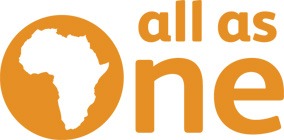 All As One works in Sierra Leone, West Africa – a country still recovering from a decade of civil war. They provide children and women with education, health care and other basic needs through a children’s home, community school and medical clinic. Since 2000, over 25,000 infants, children and adults have been helped with food, shelter, education, medical care, and other assistance.
All As One works in Sierra Leone, West Africa – a country still recovering from a decade of civil war. They provide children and women with education, health care and other basic needs through a children’s home, community school and medical clinic. Since 2000, over 25,000 infants, children and adults have been helped with food, shelter, education, medical care, and other assistance.
Story of Hope
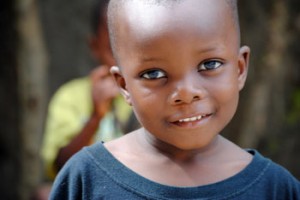
Francis, an abandoned child, now has a loving home at the All As One Children’s Center in Sierra Leone. He’s one of nearly 600 kids who have found a short or long-term home with All as One since 2000. Francis now has hope, a future and the chance to enjoy his childhood!
Global Partnerships
Description
 Founded in 1994, Global Partnerships (GP) is a nonprofit social investor whose mission is to expand opportunity for people living in poverty in Latin America. Working with local partner organizations, GP invests in and develops sustainable solutions to help impoverished people in Latin America earn a living and improve their lives, including microcredit, basic health care, business education, and technical assistance for farmers. At the end of the last fiscal year, GP had more than $36 million invested in 30 partner organizations in seven countries, positively affecting the lives of more than 250,000 people, and advancing business models that can serve millions of people in the future.
Founded in 1994, Global Partnerships (GP) is a nonprofit social investor whose mission is to expand opportunity for people living in poverty in Latin America. Working with local partner organizations, GP invests in and develops sustainable solutions to help impoverished people in Latin America earn a living and improve their lives, including microcredit, basic health care, business education, and technical assistance for farmers. At the end of the last fiscal year, GP had more than $36 million invested in 30 partner organizations in seven countries, positively affecting the lives of more than 250,000 people, and advancing business models that can serve millions of people in the future.
Story of Hope
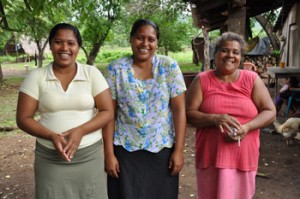
In a rural community in Nicaragua, these two sisters and their mother are creating a new future for their family. Thanks to programs supported by Global Partnerships, Ana Elisa, Rosa Amelia, and Rosa Esmeralda Gonzalez have received access to microloans, technical assistance and other support that have helped them build thriving small farms. With their profits, they have been able to build homes for their families. A shared dream is to purchase a pump so that they won’t have to haul their water from the river.
Landesa
Description
 Landesa partners with governments and local organizations around the world to ensure that poor families have legal rights to the land they till. Founded as the Rural Development Institute in 1967, Landesa has helped more than 100 million poor families gain legal control over their land. When families have secure rights to land, they can invest in their future to increase their harvests and reap the benefits – improved nutrition, health, education, and dignity – for generations.
Landesa partners with governments and local organizations around the world to ensure that poor families have legal rights to the land they till. Founded as the Rural Development Institute in 1967, Landesa has helped more than 100 million poor families gain legal control over their land. When families have secure rights to land, they can invest in their future to increase their harvests and reap the benefits – improved nutrition, health, education, and dignity – for generations.
Story of Hope
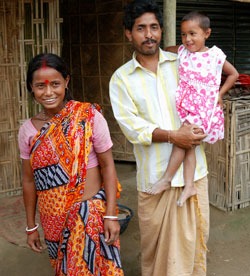
Thousands of families across India are literally growing themselves out of poverty using one of Landesa’s innovative tools: the micro-plot. When Uttam and Kamala Mondal became owners of their tennis-court-sized plot of land, they finally had a place to build a home, a garden to boost their children’s nutrition, a place to start a home business, and a foundation for a better future. Landesa is actively partnering with 13 country governments to enact and implement land rights reforms and programs that have helped more than 2 million families gain control over their land in the last year alone. Over the last 40 years our partnerships have benefited 100 million of the world’s poorest families. Our goal is to help 20 million more in the next four years.
Mercy Corps
Description
 Mercy Corps is a global humanitarian organization that helps people turn the crises they confront into the opportunities they deserve. Driven by local needs, their programs provide communities in the world’s toughest places with the tools and support they need to transform their own lives. Their worldwide team in 41 countries is improving the lives of 19 million people. For more information, see mercycorps.org.
Mercy Corps is a global humanitarian organization that helps people turn the crises they confront into the opportunities they deserve. Driven by local needs, their programs provide communities in the world’s toughest places with the tools and support they need to transform their own lives. Their worldwide team in 41 countries is improving the lives of 19 million people. For more information, see mercycorps.org.
Story of Hope
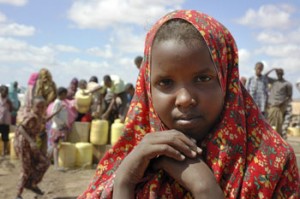
Until recently, 10-year-old Fatima spent close to two hours a day trekking around bone-dry northeastern Kenya to fetch water for her family. Often there wasn’t water to be found, or it cost too much money. Now thanks to Mercy Corps’ work trucking water, and repairing and fueling pumps, Fatima and her family can get water cheaper and easier. Fatima is just one of the 900,000 people Mercy Corps is helping in Somalia, Kenya and Ethiopia as they struggle with the worst draught in decades. We’re providing access to life-saving food, water and income, and empowering people to better withstand drought in the future through health services, veterinary care, improved water and livestock management, and other vital resources.
PATH
Description
 PATH is an international nonprofit organization that creates sustainable, culturally relevant solutions, enabling communities worldwide to break longstanding cycles of poor health. By collaborating with diverse public – and private – sector partners, PATH helps provide appropriate health technologies and vital strategies that change the way people think and act. PATH’s work improves global health and well-being. For more information, please visit www.path.org.
PATH is an international nonprofit organization that creates sustainable, culturally relevant solutions, enabling communities worldwide to break longstanding cycles of poor health. By collaborating with diverse public – and private – sector partners, PATH helps provide appropriate health technologies and vital strategies that change the way people think and act. PATH’s work improves global health and well-being. For more information, please visit www.path.org.
Story of Hope
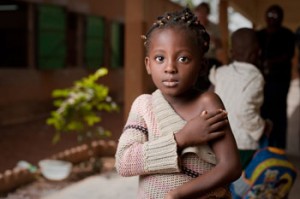
For centuries, children like Océane were helpless against the meningitis epidemics that ravaged sub-Saharan Africa. But today, Océane is one of more than 20 million people protected from the disease. In 2010, PATH and the World Health Organization introduced a revolutionary vaccine for meningitis A into Burkina Faso, Mali, and Niger. Among the millions of people who received the vaccine, not a single case was reported during last year’s epidemic season. PATH’s 2011 goal: Introduce the vaccine to several more countries in Africa – and give more than 50 million people a chance for a healthy life.
World Vision
Description
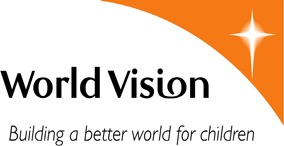 World Vision is a Christian humanitarian organization dedicated to working with children, families, and their communities worldwide to reach their full potential by tackling the causes of poverty and injustice. World Vision’s dedication to the highest stewardship standards is unswerving. The excellence of the organization’s work has earned the trust of more than 3 million donors, supporters, and volunteers; more than half a million child sponsors; thousands of churches; hundreds of corporations; and government agencies in the United States and around the world.
World Vision is a Christian humanitarian organization dedicated to working with children, families, and their communities worldwide to reach their full potential by tackling the causes of poverty and injustice. World Vision’s dedication to the highest stewardship standards is unswerving. The excellence of the organization’s work has earned the trust of more than 3 million donors, supporters, and volunteers; more than half a million child sponsors; thousands of churches; hundreds of corporations; and government agencies in the United States and around the world.
Story of Hope

By equipping children like 12-year-old Rosa in Ecuador to attend school, World Vision is empowering families to break the cycle of poverty. And that’s just one of the many ways they are helping build a better world for children. In nearly 100 countries, World Vision is working to improve access to essentials like educational opportunities, critical healthcare, safe water, nutritious food, and more.
Back to Top
Welcome New Members
Please welcome our newest Global Washington members. Take a moment to familiarize yourself with their work and think of opportunities for support and collaboration!
Create Good Foundation
The Create Good Foundation is committed to helping the lives of poor people who live and work in coffee growing regions around the world through water and economic infrastructure projects. Clean water and jobs for the developing world. www.creategood.org
Hands for Peacemaking Foundation
The mission of Hands For Peacemaking Foundation is to promote opportunities for self-reliance in rural Guatemala. www.handsforpeacemaking.org
East African Community Services
East African Community Services (EACS) was established in 2000 to provide culturally specific advocacy, information, referral and direct social services to Somali, Oromo, Ethiopian and other East African refugees living in King County. www.eastafricancs.org
Back to Top
Announcements
Global Washington Seeking Stories Of Individuals Whose Lives Have Been Deeply Impacted By Global Education!
Global Washington’s Global Education Initiative represents a statewide collaboration among leaders from the education, nonprofit, government and business communities. Collaborators are united by their shared commitment to equipping the state’s students to be leaders in 21st century workplaces and communities and to maintaining the innovation and excellence that are synonymous with Washington State’s business, academic and civic institutions. Those involved believe that a globally-oriented K-20 education system is the engine that will power the state’s sustained success in these areas.
Credible research and compelling real-world examples are integral to this work. If you know of people, businesses, institutions or communities with great stories to tell about their successes in the realm of global education and global engagement, we’d love to hear about them! Send your stories to Bookda Gheisar, Bookda@globalwa.org by October 28, 2011.
Click here for more information about the initiative and the kinds of stories we are looking for.
A Gala In Support Of Guatemala
Guatemala Village Health and Pre-Vent will host a dinner on November 5th to raise funds for the maternal-child health services they provide for Healing the Children’s Monterrico Community Clinic and Health Education Center in Guatemala. The evening’s event, held at the Museum of Flight in Tukwila, will include live music, a formal dinner, guest speakers and a silent auction. Congressman Jim McDermott will be the keynote speaker at this event, music performance will be by Sin Fronteras, and dinner will be catered by McCormick and Schmidt. Festivities begin at 5:30pm. Purchase tickets ($75) before November 1st online.
Social Change Is Serious Business: An Innovative Workshop From UW Foster School Of Business
UW Foster School of Business will host the day-long UW Social Ideas to Global Ventures Workshop, Social Change is Serious Business, on October 22, 2011. Open to students of all disciplines, faculty, staff, and community members, the workshop provides a foundational understanding of global social entrepreneurship in developing countries and outlines the process of turning an idea into a viable business. Particular focus will be given to global health and technology. The daylong workshop includes interactive sessions on marketing, management, law, and funding, led by experts from Seattle-based organizations. Students participating in the GWEC competition will have opportunities to exchange ideas and network. The workshop runs from 8:30am to 5:30pm in Paccar Hall, and costs $20 for students and $50 for all other attendees. Register online.
Dining For Dental Care
Smiles Forever will host its 11th Annual Dinner and Auction, “That’s Amore,” on October 22nd. Smiles Forever, supported mainly through private donations, provides indigenous women and children in Bolivia dental care and has founded a dental hygiene clinic that provides job training and employment opportunities for the women. The fundraising event, complete with wine, jazz music, and vegetarian or gluten free dinner options, will be held at the Queen City Yacht Club, Seattle, starting at 6pm. Tickets cost $50 per person, or $350 for a table of eight.
Fighting Poverty Through Innovative Business Solutions: A Competition
Calling all university students around the world and across all disciplines and levels of study. The Global Social Entrepreneurship Competition (GSEC ) invites you to submit innovative business solutions to poverty in developing countries. The application deadline is November 9th, 2011. Fifteen to twenty teams of students from around the globe will be selected to present their ideas to 400+ business professionals at GSEC Week 2012, held in Seattle from Feb. 27 to March 2nd, 2012, and compete for $30,000 in monetary prizes, including global health and Information & Communication Technology (ICT) prizes! Travel scholarships are available for international teams, supported by the Bill & Melinda Gates Foundation. GSEC is organized by UW Foster School of Business each year. Rules, guidelines, and applications are available on the Rules & Prizes page. You can also contact gsec@uw.edu with questions.
Creating Solutions, Awareness And Innovation In Global Health: Another Competition
Calling all high school, community college and undergraduate students in Washington State. Here’s your chance to broadcast your talents and innovation. The “Be the Change” competition, sponsored by Global Health Nexus, is an opportunity for student teams to design projects using technology, social media, the arts and more that create solutions, awareness and innovation in global health. The projects can range from innovative solutions to service delivery issues to advocacy and awareness campaigns through social media. Winning projects will receive a range of prizes, from cash awards to VIP-escorted tours of leading global health organizations, including the Bill & Melinda Gates Foundation and PATH; and participation in the VIP awards ceremony at Seattle Center, as part of the Next Fifty Celebration. Initial project proposals must be submitted by December 15, 2011. For more information and application forms go to Global Health Nexus or contact info@globalhealthnexus.org.
Global Partnerships Adds Colombia To Its Map
The social investor and micro-finance organization, Global Partnerships, has made its first loans to two new partner organizations in Colombia: Fundación Amanecer and Contactar. Fundación Amanecer received a loan of US$1 million to help them build a more diverse economy in Orinoquía, a region of central-east Colombia that has been heavily dependent on the petroleum industry. Micro-entrepreneurship education will help clients boost their skills and income. Contactar, one of the few micro-finance institutions in Colombia focused on rural clients, received US $1.5 million, which will strengthen their program of offering clients access to financial education, savings accounts and basic dental services for their children.“We are excited to help these organizations increase their impact in Colombia, which is one of the most populous countries in Latin America and which faces unique challenges in fighting poverty,” said Mark Coffey, Chief Investment Officer of Global Partnerships.
UW Hosts Talk With Executive Director Of The International Gay And Lesbian Human Rights Commission
The University of Washington’s Gender, Sexuality, and Global Health Working Group is presenting a talk with Cary Alan Johnson, Executive Director of the International Gay and Lesbian Human Rights Commission (IGLHRC) on Tuesday, October 25th. Entitled “The Final Frontier: Why LGBT Global Rights are a Game Changer, and will Liberate Us All,” the talk will take place at the Foege Auditorium (3720 15th Ave NE in Seattle) from 4:30 to 5:30pm and will be followed by a reception. The IGLHRC is a leading international organization dedicated to human rights advocacy on behalf of people who experience discrimination or abuse on the basis of their actual or perceived sexual orientation, gender identity or expression. For more information, contact the Global Health Resource Center at ghrc@uw.edu or 206.685.7362
Fred Hutchinson Cancer Research Center To Build Treatment Center In Uganda
The Fred Hutchinson Cancer Research Center is collaborating with the Uganda Cancer Institute to create a new cancer training and treatment facility in Kampala, Uganda. This innovative project will be the first cancer center to be constructed in partnership between a cancer institution in the U.S. and one in sub-Saharan Africa. Once completed the new facility will be three stories tall and will include exam rooms, procedure suites, pharmacies, an infusion suite, and specialized diagnostic laboratories for both adult and pediatric care.
The groundbreaking ceremony on October 4th was led by Ugandan Vice President Edward Ssekandi and attended by other officials, global health experts, and community leaders. “We are gathered here today to celebrate a great example of a partnership between two institutions dedicated to saving lives – the Uganda Cancer Institute in Uganda and Fred Hutchinson Cancer Research Center in Seattle, Washington.” said Ssekandi in his remarks. “I offer my congratulations to the two institutions who have come together, dedicated to improving the health and well being of people in Uganda and worldwide.”
For more information on this project, visit: http://www.fhcrc.org/about/ne/news/2011/10/11/uganda_groundbreaking_release.html
Tuesdays At iLEAP
The 2011 iLEAP International Fellows are hosting a series of candid discussions exploring critical questions around global philanthropy and development and the relationship between good intentions and impact. iLeap Fellows lead social change initiatives all over the world, including the Dominican Republic, Nicaragua, Papua New Guinea, El Salvador, India, Indonesia, Honduras, and the Philippines. You are invited to join these open dialogues each Tuesday starting October 11th and lasting through November 15th.
Upcoming topics are as follows:
October 25th:Food & Agriculture
November 1st:Environment & Community
November 8th:Youth Empowerment
November 15th:Gender & Development
Click here for more information on Tuesdays at iLEAP, visit www.iLEAP.org, or contact molly@iLEAP.org
Back to Top
Global Washington Events:
October 31st and November 1st
Global Washington’s 3rd Annual Conference
November 18th
Summit on Global Education in Washington State
Back to Top
Other Events:
October 18th – 29th
2011 National School Conference on International Youth
October 19th
Religious Tolerance and Global Cooperation
October 20th
Northwest Immigration Rights Project: An Evening at Wing Luke
October 22nd
UN Day Celebration
University of Washington Invention to Venture Workshop
October 25th
The Final Frontier: Why LGBT Global Rights are a Game Changer, and Will Liberate Us All
TUESDAYS @ ILEAP
October 26th
Veterans Services and Support
October 27th
The View from Karachi – What the Mega-City Tells us about Pakistan
October 30th – November 1st
IEEE GLOBAL HUMANITARIAN TECHNOLOGY CONFERENCE (GHTC)
November 1
Save the Date: PeaceTrees Vietnam 16th Anniversary Luncheon
TUESDAYS @ ILEAP
Together We Can: Building Schools and Hope in Seattle Leone
November 5th
PRE-VENT and Guatemala Village Health dinner/Fund-raiser
13th Annual Africa Business Day Forum
November 8th
TUESDAYS @ ILEAP
November 15th
Seattle Int. Foundation: Women in the World Breakfast Event
TUESDAYS @ ILEAP
Gambia Help: 2011 Auction & 12th Anniversary Celebration
A Bright Future for Business Education in Rwanda
Posted on October 19, 2011.
The Sun is rising at Kigali’s School of Finance and Banking
By Dr. James Hembree
Sunrise at Mburabuturo Hill, home of Kigali, Rwanda’s School of Finance and Banking, is a splendid sight. Perhaps that is why the day starts so early here. It is early September and I am at SFB as a Fulbright Specialist from Seattle University working on a six week consulting project in resource development. The students have just completed their final exams. During finals week, each day unfolds in an unvarying pattern. At 4:30 a.m. the first cock crows in the distance. At 5:30 a.m. glimmers of daylight begin to brighten the rooftops and the plots of farmland on the surrounding hills. By 6:00 a.m., students are already streaming onto the campus from the neighborhoods where they live.
They come at that early hour to get a jump start on a day spent pouring over journal articles and class notes, rehearsing answers to practice questions, grilling each other on issues in finance, accounting, marketing, and human resource management. These are the four main disciplines taught at School of Finance and Banking (SFB), a public institution established by Rwanda’s government in 2002 to develop talent for the financial sector.
Another reason that students come early is to lay claim to a favorite study spot, not in a library, a campus café or a student lounge, but on spacious lawns among the trees, around outdoor picnic tables, in narrow stoned-paved passageways between buildings, and under clotheslines laden with freshly hung laundry from the school’s residence hall. (Two hundred nineteen of SFB’s 2,787 students live on campus, a benefit reserved for single women with security concerns and students with other special needs.)
Space is at a premium. The campus was built to serve 500 students but has grown to six times that size. By 10:00 a.m., every patch of shade will be occupied by students gathered in groups of 3 or 7 or 15. They also sit in hallways. Four students are packed into the stairwell immediately outside my office door as I write this paragraph. After sundown, the activity continues. Clusters of young people huddle under every available street light and security lamp on campus. It is as though they refuse to waste a single kilowatt that might be harnessed in the pursuit of knowledge. This is SFB during exam week. It is a splendid sight.
It is not that students here are any less subject to distractions than their peers elsewhere in the world. In fact, they are torn in many directions by the demands of work and family. Many hold part time jobs not just to pay for tuition but to contribute to the livelihood of parents and siblings. The US$955 per year price tag on an SFB education is tough in a country where most people earn less than US$2 per day. While the government heavily subsidizes the cost for students who pass with high enough scores on standardized tests (about fifty percent of the student body), the rest must pay their own way as best they can.
There are other challenges, too. Challenges not known by students in other, more privileged and historically peaceful parts of the world. The demographics of SFB reflect Rwanda’s difficult past. Many are child heads of households, HIV or genocide orphans, or recovering child soldiers struggling to change the destiny that fate or misfortune initially sent their way. I heard a young man say as much a few days ago in a public celebration hosted by Generation Rwanda, an organization that provides scholarships and mentoring for young people such as these. “The four years I have spent at SFB,” he said, “have changed my fate.” Sometimes the simplest truths directly stated are the most powerful. It was a riveting declaration, and a hopeful one.
In the midst of these challenges, the students’ thirst for knowledge remains my dominant impression at the end of a month at SFB. It is perhaps the greatest asset of Rwanda’s burgeoning school of business, a clear and early sign of its promising future. As an advisor for the school’s resource development strategy, I am also convinced that this thirst is a major reason why the world should pay attention to these students. It is why we should lend them both our moral and financial support.
Another of SFB’s assets is its strikingly beautiful and strategic location. Rwanda is known as the land of a thousand hills and SFB has been granted one of the best of them. Campus buildings cluster on 22.3 hectares of prime real estate atop a gently rounded knoll, originally the site of a secondary school established by Swiss Presbyterians in the 1960s. A walk around the perimeter reveals 360 degree views that elegantly evoke ideas about intellectual vision. Better still, this hill is adjacent to Kigali’s downtown business core which rambles over the crest of an adjacent rise. Two hills side by side, suggesting the partnership of gown and town, knowledge in the service of pragmatic goals.
SFB plays a crucial role in Rwanda’s effort to stimulate economic development through home grown entrepreneurship and investment in the private sector rather than through an excessive dependence on international aid. The country’s GDP grew by an estimated 7.4 percent in 2010 and SFB’s degree and certificate programs focus on high demand areas in this dynamic economy. Finance is the most popular degree with 682 majors currently. Accounting runs a close second with 510. Almost all of them will find jobs quickly. To ease the transition from school to work, a six week internship is required of every SFB senior who is not already employed. Many of these are hosted by the country’s major banks: Banque Populaire de Rwanda, Bank of Kigali, Access Bank, COGEBANK, and others.
Entrepreneurship is a major focus of SFB’s curriculum. Rwanda places great hope in college graduates who have the skills to forego job seeking in favor of job creation. A proposal is under review by the Rwanda Development Board to expand entrepreneurship training for SFB students. The school also offers a Women’s Entrepreneurship Program in partnership with the University of Michigan Business School and Goldman Sachs. Soon to begin its fourth year, the program delivers six months of specialized training to 60 small scale business women recruited from every corner of the country, including rural, agricultural areas. That’s 60 women annually, with a goal of reaching 300 women over five years.
The bond between gown and town extends in Rwanda to the public sector. A three way partnership between government, business and SFB yields promising new strategies for educational finance.
For its part, Rwanda’s Ministry of Education is committed to building physical infrastructure. Three major construction projects are underway at SFB at the same time: an Instructional Center, a Sports Center and, towering over the eastern rim of the campus, an impressive, multi-purpose complex that will transform the learning environment for SFB students. This eight floor facility will house some 50,000 square feet of classroom and computer lab space, two 300 seat auditoriums, faculty offices and public gathering areas. SFB is paying for the first two projects out of operating revenue, but the third and largest building is fully funded by the government.
Recognizing the limits of public coffers, however, SFB is putting its business acumen to work to generate funds through private enterprise. In the spring of 2010, SFB Rector Dr. Reid Whitlock received approval to establish Prism East Africa, a new, profit-making subsidiary of SFB in which the school has invested its own working capital. Enterprises planned include actuarial and appraisal services, executive training, mineral certification (important in mineral rich East Africa), management consulting, and publishing. A graduate of Harvard Business School and Princeton with an impressive executive leadership resume, Whitlock has the energy and the background to make the strategy work. If successful, Prism East Africa could be replicated by other schools not only in Africa but around the world.
A final asset of SFB cannot escape notice: The priority that many students place on religious faith. SFB is a secular campus in its administrative vision. Hence, it is not the imposition of executive leadership or a founding religious order or, of a church or government that brings about the intersection of faith and learning at SFB. It is the students themselves. And what has emerged is a multi-faith community.
Each morning at first light I hear from my apartment in SFB faculty housing the rising cadences of a Muslim call to prayer. Following close behind is the swell of praise courses from a nearby evangelical church. And, finally, as though in antiphonal response, the ringing of bells announcing an early morning Catholic Mass. Rwanda enjoys a mix of Catholics, Protestants, Seventh Day Adventists, Muslims, Pentecostals and other traditions. All are represented at SFB in an atmosphere of religious tolerance that appears to be working well.
And so three assets: A thirst for knowledge that brings throngs of students to campus at 6:00 a.m., a strategic location that fosters learning in the service of economic development, a grounding in values infused with the light of an inclusive transcendence. These are foundation stones upon which one could build, in any culture or country, a great and lasting center of learning.
The road may be long and fraught with challenges—too little space, not enough technology, a shortage of faculty, financial barriers for students and families, and so on. But SFB’s Rector is optimistic. Whitlock came to SFB by presidential appointment in March 2010. He had been in Rwanda for three and a half years as director of On The Frontier, a company specializing in national export strategies for underdeveloped or neglected post-conflict economies. For Whitlock, the move to SFB was a natural transition when Rwanda completed the initial rebuilding phase of the post 1994 Genocide era. “Now is the time,” he says, “to invest in the development of the human capital that will carry Rwanda forward.”
As a Fulbright Specialist working with SFB to advance this mission through creative partnerships and resource development, I feel privileged to offer what I can to bring this goal to fulfillment.
The author is the Senior Director of Development at Seattle University in Seattle, Washington, USA. He is in Rwanda for six weeks as a Fulbright Specialist grantee hosted by SFB (School of Finance and Banking) to work on resource development strategies.
jmhseattle@yahoo.com
First published in The New Times on Tuesday September 6, 2011
Take Action to Advocate for the International Affairs Budget
Posted on October 6, 2011.
Tell Senator Murray now: Protect the International Affairs Budget! As co-chair of Joint Select Committee on Deficit Reduction (aka the “Supercommittee”) Washington Senator Patty Murray is in a powerful position to influence the recommendations the committee makes, by November 23, 2011, for at least $1.5 trillion in additional deficit reduction steps. Sign onto a letter to her to advocate for the International Affairs Budget.
The non-profit global development world is responding with a strong voice. Over 125 organizations (including Global Washington and eight Global Washington members) signed onto a letter to the Congressional leadership and the Joint Committee members supporting the International Affairs Budget.
Global Washington and Oxfam have prepared a similar letter to Senator Murray, both as the senior Senator from the State of Washington, and in her role as co-chair of the committee, to be signed by organizations based in Washington State. Would your organization like to be part of the action? Send your organization’s name and the name of the individual signing on the organization’s behalf to Bookda@GlobalWA.org, and we will add your organization to the list of signers. Act quickly! We will send the letter by the Joint Committee’s deadline for input: October 14, 2011.
If you would like to send your own letter to Senator Murray, you can visit the Global Action Day website, and click on the “Advocate” button. Global Washington and several of its members are sponsoring the Global Action Day Campaign. 11.1.11 is Global Action Day. Global Action Day has been proclaimed by the mayor of Seattle as the day when we recognize the accomplishments, innovation and impact of Washington State’s growing global development sector. Global Day Action is also an opportunity for Washingtonians to learn about, support and join the more than 140 members of Global Washington who are working to create jobs at home and impact lives abroad by reducing disease, providing educational opportunities and strengthening communities and economies around the world.
Stay tuned for the Supercommittee’s recommendation by November 23, and the Congress’ “up or down” vote by December 23.
Protecting Endangered Languages
Posted on September 30, 2011.
Endangered languages don’t attract nearly as much attention as endangered animals or plants. In fact, they get almost no media attention at all. Should they?
On Tuesday evening, September 27th, Global Washington and Microsoft (more specifically Microsoft’s Local Language Program) hosted a special screening of the documentary “The Linguists,” at MOHAI, followed by a talk with one of the linguists in the film and visiting specialist at Microsoft, Dr. David Harrison. The event brought together a diverse audience of high school students (kudos to Roosevelt High’s AP Human Geography class), educators, representatives from an array of local non-profits and Microsoft techies, among others.
The documentary follows Harrison and his sidekick Greg Anderson, of Living Tongues Institute for Endangered Languages, to various parts of the world as they seek out languages that are disappearing, and provide each a resurrection through their interactions and recordings. It’s a documentary well worth the hour, not only to learn about the vulnerability of certain languages and their intersections with more dominant languages and cultures, but also for the humor, insights and adventures Harrison and Anderson share with the viewers. They take us to corners of the world seldom noticed, provide tidbits of curious information, and remind us that the answers we seek are often in the least likely of places.
The evening’s presentation brought to the fore the importance of learning from the languages before they vanish. Harrison emphasized that technology is now working towards elevating languages, but also pointedly stated that one does not need to travel to remote places, nor tap into technology to find endangered languages. Seattle, he noted, is a “fascinating linguistic mosaic,” with a variety of endangered indigenous languages. All that is required to seek out and appreciate these languages, Harrison stated, “is a shift in attitudes, the ability to value what people know.” He suggests that we “always be in tune to the linguistic environment around [us] and learn from that.”
“People light up when they see you are interested in their language,” Harrison shared. “People do love their language and do want to keep it.”
Harrison provided a number of reasons to value linguistic diversity: It provides intellectual diversity, makes you smarter, and broadens cultural knowledge. “It’s an intellectual asset to know another language.” Prioritizing language acquisition, and the intellectual benefits of such, will also be discussed in depth at Global Washington’s Summit on Global Education on November 18th. “Children don’t have to give up one language in order to learn another one,” Harrison opined. “But once they make that decision, it tends to be irreversible.”
Efforts towards maintaining languages are making inroads. Native People’s groups in the States, such as the Cherokee, have made a decision to keep their language, Harrison noted, while many other communities are pushing back at linguistic oppression to hold onto their language. “Linguistic rights are human rights,” he stated. “A connection needs to be made between the two.”
So, in this blogger’s opinion, yes, endangered languages and their cultures do deserve more attention and protection. And for those of us looking to learn a new language or travel, some wise words from the linguists: “You’ve got to breath it in, get out there and dance with the people.”
Global Partnerships Makes First Investments In Colombia
Posted on September 29, 2011.
Global Partnerships Makes First Investments In Colombia
Online press release
Seattle, Wash., – Global Partnerships (GP), a nonprofit social investor based in Seattle, Washington, and Managua Nicaragua, announced today that it has made its first loans to two partner organizations based in Colombia: Fundación Amanecer and Contactar. With the addition of these two partners to its portfolio, GP is supporting the work of 33 microfinance organizations and cooperatives in eight countries in Latin America, including Bolivia, Colombia, Ecuador, El Salvador, Honduras, Mexico, Nicaragua and Peru.
“By investing in the innovative work of Fundación Amanecer and Contactar, we are helping poor and underserved populations in Colombia access critical services to help them earn a living and improve their lives,” said Mark Coffey, Chief Investment Officer of Global Partnerships. “We are excited to help these organizations increase their impact in Colombia, which is one of the most populous countries in Latin America and which faces unique challenges in fighting poverty.”
In late August, 2011, Global Partnerships made its first loan to a Colombian partner, $1 million to Fundación Amanecer, a small, growing microfinance institution (MFI) that is helping jump-start a more diverse economy in Orinoquía, a region of central-east Colombia that has been heavily dependent on the petroleum industry.
Fundación Amanecer, a nonprofit, serves 4,200 people with a combination of microloans and micro-entrepreneurship education to help its clients boost their skills and income. For example, it offers a curriculum in computer literacy, technical assistance for farmers and job-skills training in fields such as clothing manufacturing, shoemaking, baking and carpentry.
In late September, GP disbursed $1.5 million to a second Colombian partner, Contactar, an established nonprofit microfinance organization in southwest Colombia that is one of the few MFIs in the country to focus on rural clients. Eighty-five percent of Contactar’s 13,500 clients are rural; the majority of clients work in agricultural enterprises. In addition to microcredit, Contactar has begun to offer its clients access to financial education, savings accounts and basic dental services for their children.
The loans were made by Global Partnerships’ Social Investment Fund 2010 (SIF 2010), a five-year, $25 million debt fund that provides affordable loans to a select portfolio of microfinance organizations and cooperatives. GP’s partners range in size and business model, but are similar in their focus on reaching people in need and providing not just microcredit but services such as business education, health services and agricultural technical assistance. SIF 2010 requires that 75 percent of organizations that it funds offer such “microfinance-plus” services.
SIF 2010 has disbursed a total of $20.25 million in loans to 20 organizations since the fund was closed in September, 2010, including 12 new partners to Global Partnerships.
About Global Partnerships:Founded in 1994, Global Partnerships (GP) is a nonprofit social investor based in Seattle, Washington, and Managua, Nicaragua, whose mission is to expand opportunity for people living in poverty. GP invests in and develops sustainable solutions to help impoverished people in Latin America earn a living and improve their lives, including microcredit, basic health care, business education, technical assistance for farmers and green technology. Find out more at www.globalpartnerships.org.











